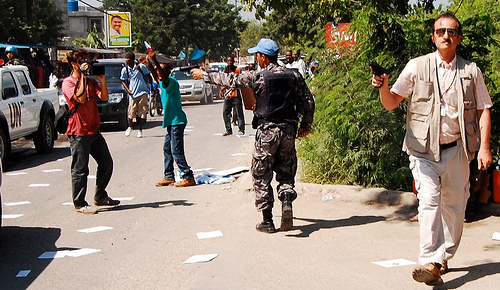A tense morning on Oct. 15 in Port-au-Prince: shots fired in the air and blows traded between UN security personnel and a crowd of some 100 demonstrators gathered outside the UN headquarters in Port-au-Prince to protest the renewal of the forces’ mandate here.
Though the mandate was officially renewed on Oct. 14, a coalition of grassroots and political opposition groups took to the streets to call for the end of what they say is an occupying force costing millions but doing little to ensure the security of the general population.
Despite having been warned of a protest, UN security personnel seemed unprepared to handle the crowd, who blockaded the entrance to the base, stopping traffic and spraying anti-UN slogans on official cars trying to enter. There have been many similar protests throughout the past couple of months, but Oct. 15’s clashes were some of the most intense seen here in recent weeks.
At one point a security officer waded into the crowd sparking pushing and shoving, blows were traded followed by shots fired in the air by the Jordanian soldiers forming a cordon around the base. A reckless UN vehicle pushed a handful of journalists, including myself and Al Jazeera’s correspondent, into a trash-filled ditch. As security chiefs made calls asking for tear gas, reinforcements soon arrived in full riot gear and the crowd eventually dispersed. Both chiefs covered up their UN identification and refused to call in the UN press officer.
The UN mission was invited in to Haiti in 2004 by the US-backed Gerard Latortue’s regime after the coup d’etat against former Haitian president Jean-Bertrand Aristide threatened to plunge the country into a civil war. That threat subsided long ago but the mission doesn’t seem likely to end anytime soon.
Similar protests take place every year on the mandate’s expiry date, but lingering resentment has grown after “MINUSTAH’s” handling of the January 12th earthquake and its aftermath. Rather than helping pull people from the rubble they focused on protecting facilities from “looting.” Since then, despite this presence of more than 13,000 troops and armed police, rape inside the camps has quadrupled, violence against internally displaced is growing with many forcibly expelled from their camps, and concern is mounting that as Haiti enters its often-turbulent election season, political factions are distributing weapons in preparation for a campaign of intimidation.
But many Haitians don’t see the UN forces as helping with any of that. Everywhere you go in this city there’s evidence of the animosity many feel towards their presence. The ubiquitous graffiti slogans of “down with the occupation” or “down with UN thieves” speak to the general perception of the UN troop presence here.
As grassroots campaigner and demonstrator Yves-Pierre Louis explains: “It violates the Haitian constitution and the UN charter which specifies that such a force is only necessary in a country which threatens international peace and security. Haiti is not at war… it does not produce atomic bombs, terrorists or drugs, so where is the threat?”
Neither the officer in charge of the riot team, not the MINUSTAH Spokesman, Vicenzo Pugliese, made an official comment on the protest.
One of the reasons cited by the UN Security Council in Thursday’s decision to renew the mandate was that the continued presence of UN forces would help to ensure a “credible and legitimate” vote on November 28. But this comes as complaints are growing that the process has – up to now – been anything but. As 45 members of the US Congress recently warned in a letter to US president Barack Obama, the exclusion of major political groups such as Fanmi Lavalas, Aristide’s party and one of the few with any widespread popular support, invalid the electoral process as unfair, unconstitutional and undemocratic.
Oct. 15th was also the official beginning of political campaigning, but many Haitian’s living in camps insist they will refuse to vote while under tarpaulins. They say they have participated in the democratic process and twice had their collective will betrayed by coup d’états backed by the U.S., Canada and France. With frustrations high on the streets, with many Haitians cynical that any change in political leadership will bring improvements to their daily lives, the problem for the UN stabilization mission is that the troops are often viewed in the same light as those wishing to simply preserve the status quo in a country struggling to recover from disaster.
Isabeau Doucet is a post-graduate researcher in visual anthropology at Goldsmiths College, University of London, and a freelance journalist currently living in Port-au-Prince. A former resident of Montreal, she writes for the weekly Haiti Liberte and works with the Bureau des avocats internationaux and its director, human rights lawyer Mario Joseph. She can be reached at: disabeau@gmail.com.



